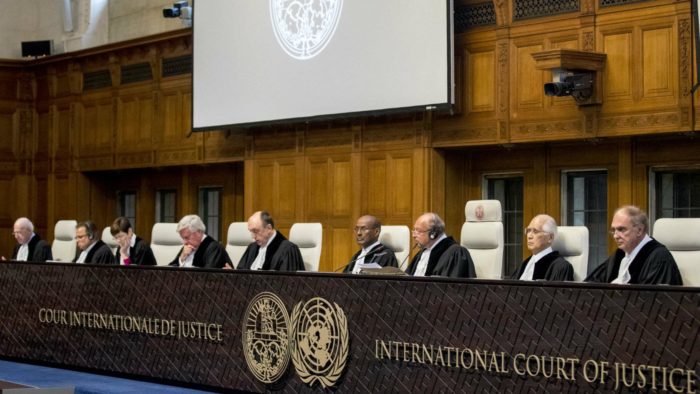The United Nations’ top court said Friday that Israel’s presence in the West Bank and East Jerusalem is illegal, in an unprecedented opinion that called on Israel to end its decades-long occupation of territories claimed by Palestinians for a future state.
The advisory opinion, while non-binding, was the first time the International Court of Justice (ICJ) has expressed its view on the legality of Israel’s presence in territories it captured in the 1967 war.
An advisory opinion is not legally binding but carries moral authority and can shape international law, according to the ICJ. Friday’s opinion prompted condemnation from Israeli leaders and praise from Palestinian officials.
In its sweeping judgment, the ICJ ran through a list of Israeli practices that it said violated international law, including confiscating land, building Israeli settlements in the territories, and depriving Palestinians of natural resources and the right to self-determination. The court called on Israel to cease new settlement activity, evacuate settlers and make reparations for the damage caused.
“The sustained abuse by Israel of its position as an occupying Power, through annexation and an assertion of permanent control over the Occupied Palestinian Territory and continued frustration of the right of the Palestinian people to self-determination, violates fundamental principles of international law and renders Israel’s presence in the Occupied Palestinian Territory unlawful,” the opinion read.
Judge Nawaf Salam, the president of the ICJ, which is based in The Hague in the Netherlands, said the court observed that “large-scale confiscation of land and the degradation of access to natural resources divests the local population of their basic means of subsistence thus inducing their departure.”
The court also found that Israel’s declaration of Jerusalem as its capital helped to “entrench Israel’s control of the occupied Palestinian territory” and said that Israeli settlements in the West Bank and East Jerusalem are “in violation of international law.”
During the 1967 war, Israel captured the West Bank, East Jerusalem, the Gaza Strip and the Golan Heights from neighboring Arab states. Soon after, it began establishing Jewish settlements in those territories.
The Palestinians want the West Bank and Gaza for a future state, with East Jerusalem at its capital. Israel considers the entirety of Jerusalem as its “eternal capital.”
In its opinion, the court concluded that all states and international organizations, including the United Nations, are under an obligation “not to recognize as legal the situation arising from the unlawful presence of the State of Israel in the Occupied Palestinian Territory.”
The case predates the current Israel-Hamas war, and stems from a 2022 request for an advisory opinion by the UN General Assembly. The 15 judges on the court were asked to consider “the legal consequences arising from the ongoing violation by Israel of the right of the Palestinian people to self-determination, from its prolonged occupation, settlement and annexation of the Palestinian territory occupied since 1967.”
It is also separate from the ICJ proceedings held in January over an accusation from South Africa that Israel was committing genocide in its war against Hamas following the October 7 attacks – a claim Israel has vehemently denied.
Implications of the ICJ opinion
While the ICJ has previously given advisory opinions about Israel’s presence in the West Bank, Friday’s announcement is a step further, some experts said.
The ICJ in 2004 delivered an advisory opinion on the Israeli separation barrier around the majority of the West Bank, urging Israel to remove it from occupied land. The nonbinding opinion had found that Israel was obligated to return confiscated land or make reparations for any destruction or damage to homes, businesses and farms caused by the barrier’s construction.
“If the 2004 opinion held that Israel had to dismantle the wall, or at least the parts of it that encroach onto the West Bank, (Friday’s opinion) holds that Israel has to withdraw as rapidly as possible from the occupied territories,” Eliav Lieblich, a professor of international law at Tel Aviv University, told CNN.
“That’s a major difference – not the legality of the settlements per se, but the implications of the settlements and the entire practice around them,” Lieblich said.
While ICJ opinions are not binding, they are perceived as “very authoritative statements of international law as is,” he said, adding that they may have an impact on international organizations taking this opinion to domestic courts, demanding for example that individual counties refrain from exporting weapons that may be used in the occupied territories.
CNN









